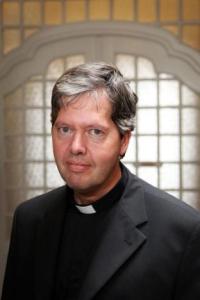The Dutch bishops have not yet spoken much in public about the upcoming Synod, but today Bishop Rob Mutsaerts, auxiliary of ‘s Hertogenbosch, does. And he makes a point that has been emphasised before by both Cardinal Kasper and Cardinal Burke: the Synod is not about divorce, remarriage and admission to the Eucharist. The question is a bigger one, as Bishop Mutsaerts explains:
 “With the extraordinary Synod of the Family which opens on 5 October, Pope Francis mostly aims for a greater appreciation of the Christian marriage as a sacrament. It is clear that in today’s culture the Biblical vision on marriage and family is considered to be virtually unattainable, and is seen more as a burden than as good news. Perhaps that is the reason for Pope Francis to have scheduled the beatification of Paul VI at the end of the Synod, as a closing statement.
“With the extraordinary Synod of the Family which opens on 5 October, Pope Francis mostly aims for a greater appreciation of the Christian marriage as a sacrament. It is clear that in today’s culture the Biblical vision on marriage and family is considered to be virtually unattainable, and is seen more as a burden than as good news. Perhaps that is the reason for Pope Francis to have scheduled the beatification of Paul VI at the end of the Synod, as a closing statement.
Paul VI was a staunch defender of Christian marriage. His famed and infamous encyclical Humanae Vitae, however, achieved the opposite according to public opinion. The Biblical ideal was almost completely forgotten. It is to be hoped that October’s Synod will not result in a repetition of Humanae Vitae. Expectations, after all, are high. Some fervently hope that the Pope will change the Church’s teaching about divorced and remarried people; others fear he will. That would result in a repetition of Humanae Vitae. And that is exactly what Pope Francis is afraid of: “I have not been happy that so many people – even church people, priests – have said: “Ah, the Synod will be about giving communion to the divorced”, and went straight to that point”, the Pope told reporters on the return flight from Israel.
The questions is much broader. The family is in crisis. Young people rarely choose marriage. They choose others ways of living together. The family is in crisis because marriage is in crisis, according to the firm opinion of Francis.
I hope that the Pope will get the Synod he has in mind, and not the Synod which is mainly concerned with the single question of divorced and remarried faithful. That is certainly a genuine problem, but a far more complex problem lies at its root: few understand marriage as a Christian vocation, strengthened by sacramental mercy. Not without reason did the Pope give it “The pastoral challenges for the family in the context of evangelisation” as title, and he placed it as such emphatically within the context of evangelisation. Evangelisation is without meaning if we consider it without the Gospel. The words of Jesus to both the Samaritan woman and the woman caught in adultery was hard to accept for those who heard it then and those who hear it now. Don’t forget that the Apostles thought that Jesus’ teachings about marriage were so difficult that it would be better not to marry. If the Synod is true to the Gospel – can she be otherwise? – she can expect the same response, and it will be her duty to inspire confidence that the Christian marriage is still recommendable.
Pope Francis is keen to emphasise that Christian marriage is a sacrament. Much of the confusion surrounding marriage and divorce arises when we lose sight of the fact that marriage is a sacrament. Marriage is not indissoluble because two people make a promise for life. The Church can dispense people from their promises. That is een true for the vows of religious. But the Church can’t undo a sacrament. Marriage is indissoluble for the same reason that we have tabernacles: a consecrated host can’t be ‘deconsecrated’, just like Baptism or the ordination of a priest can’t be undone. Even a priest who has ben laicised remains a priest, even though he can’t exercise the office of priest (although he can hear confessions in emergencies). Nobody, no Synod and also no Pope, can undo a valid sacrament. That’s simply how it is. We shouldn’t therefore expect a relaxation of rules regarding divorced and remarried people in regard to their receiving Holy Communion. Those who do expect this will be disappointed from the outset.
Most Catholics are unaware of the sacramental character of their marriage. Marriage, by the way, is the only of the seven sacrament which is not administered by a priest or deacon, but by lay people, by husband and wife when they say yes to each other. This is the sacrament that gives strength and mercy to be able to keep promises. That is what it is about for the Pope.”
To compare a laicised priest with a divorced person is a theological mistake. The sacrament of the priesthood leaves an indelible mark; the sacrament of marriage doesn’t. The priest promises chastisty and obedience to his superior; the married couple promises fidelity. The first can be “undone”, the second cannot. And I fully agree with that! But the problem doesn’t lie in the sacramentality.
Therefor I think that the real and only possible comparison between a laicised priest and a divorced man or woman, is that – just as we found a pastoral solution for the priest, we should also search for pastoral solutions for remarried divorced.
Very good to read.